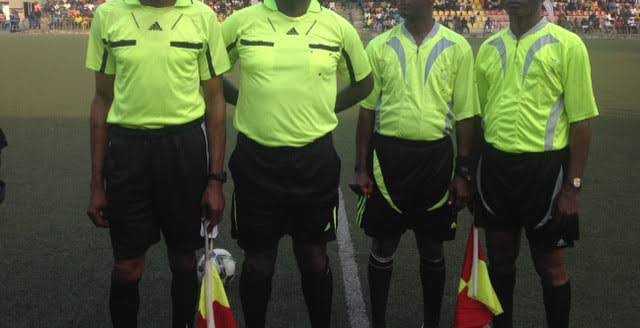Recently, the Refereeing Development Committee/Unit (RDCU) of the Nigeria Football Federation (NFF), wielded the big stick. At the receiving end of the disciplinary actions were 14 whistle men and their assistants whose poor handlings of matches in the ongoing Nigerian Professional Football League (NPFL) were believed to be capable of bringing the elite competition into disrepute.
The Committee/Unit followed up its decision with a communique addressed to the Chief Operating Officer (COO) of the NPFL), Mr. Davidson Owumi, expressing its commitment to upholding the standards of refereeing in the league. The communique highlighted the importance of technical evaluation and the need to ensure that match officials’ decisions are just and accurate.
The matches and the referees affected are: Niger Tornadoes v Rivers United (Match Day 2) – Bawa Buhari; Niger Tornadoes v Bayelsa United (Match Day 4) – Chukwaka Jahlove and Assistant Referee Akinwale Tomiwa; Sporting Lagos v Niger Tornadoes (Match Day 5) – Assistant Referee II Zachariah Nde; Gombe United v Plateau United (Match Day 5) – Referee Saeed Abdulaziz and Assistant Referee Jimmy Aimugbonrie; Rivers United v Sporting Lagos (Match Day 6) – Referee Brown Ebenezar and Assistant Referee Atuwho Morrison; Sunshien Stars v Abia Warriors (Match Day 6) – all the four officials and Bendel Insurance v Remo Stars (Match Day 7) – Referee Imamu Maliki and Assistant Referee Sunday Azi.
The disciplinary body called for the submission of the full video recordings of the matches handled by the affected referees to facilitate a comprehensive evaluation of their decisions and performances.
The suspension of these whistle men on account of questionable officiating underpinned the neglect of Nigerian referees by the continental soccer governing body, the Confederation of African Football (CAF), for many years now. Nigerian football family and stakeholders have been at sea as to why the CAF has been ignoring our referees in its competitions.
The latest of such treatment was seen in the list of match officials recently released by the body to officiate at the forthcoming 34th edition of the Africa Cup of Nations (AFCON) billed to hold in Cote d’Ivoire from January 13 to February 11, 2024. A total of 85 match officials have been picked to feature at the tournament. But none was picked from Nigeria, despite the fact the Super Eagles are among the teams to participate in the tournament. Whereas, less football nations like Zimbabwe, Burundi and even Djibouti made the cut… a development that the new Minister of Sports, Hon. John Enoh, was not pleased with.
Nigeria’s continued poor representation or lack of it for more than a decade and half has remained a worrisome situation and a thumb-down as far as that critical component of football is concerned. Selection of officials are not only based on the experience, skills and current form of the whistle men but integrity is also a key consideration.
Perhaps the most contemptuous treatment ever meted out to our referees was witnessed at the 27th edition of the AFCON Tournament held in Angola in 2010. Only one assistant referee from Nigeria was considered capable of officiating at the tournament, whereas South Africa had two centre referees and assistants for the tournament. Angola, Egypt and Tunisia, among others, each produced a referee and an assistant. As usual, officials from minuscule countries like Seychelles, Republic of Benin were given slots as centre referees. Even Saudi Arabia and Iran, two non-African countries, had slots on the list of match officials.
In the 70s through to the 90s, Nigeria was a force to be reckoned with and its referees could not be ignored by both the CAF and FIFA in all their championships. At that time, Nigeria was rated the third best football nation on the continent. By 1994 when Nigeria made its first appearance at the FIFA World Cup Finals, the Super Eagles were ranked the 5th in the world. Its domestic football was vibrant and the standard of refereeing was very high.
Most of the referees and linesmen as the assistant referees were referred to in those days wore the FIFA badges. Refereeing is, no doubt, an integral part of football and it is quite obvious that the nation’s refereeing fortune has nosedived in recent years, consequently going off the CAF’s radar.
Notable referees who have done the country proud in and outside the continent included the likes of Festus Okubule, R. O. Oyeyemi, Bulus Ishaya, S. Olanrewaju, Reuben Mannok, John Saiki, S. O. Fehintola and Linus Mba. These referees may have hung their whistles, some have even passed on, but they left indelible marks on the soccer turfs. They were men of honour and integrity who exhibited transparency and displayed total commitment to their trade. Their whistles were not tainted with questionable decisions.
A nation’s football is as good as its referees. The low rating of Nigerian referees is not be unconnected with the bad image some members have cut for themselves. Allegations of bribery and corruption have been plaguing our domestic leagues. There are numerous instances of matches ending in mayhem because referees and their assistants have compromised.
The NFF’s RDCU deserves commendation for the actions taken against the errant match officials. It has a responsibility to ensure that the football space is purged of bad eggs. That will be the first step towards restoring the nation’s glory in international refereeing.




